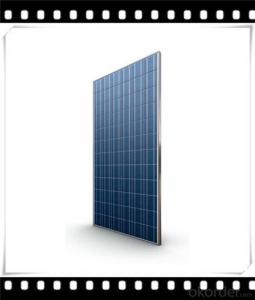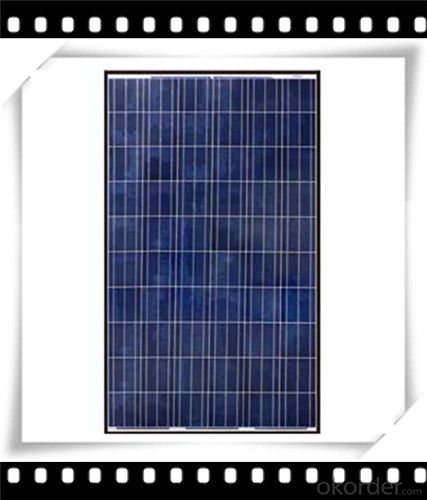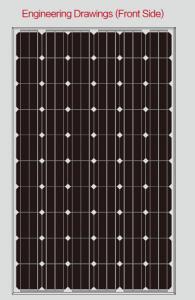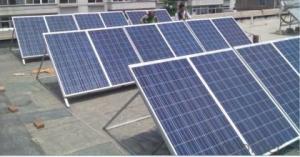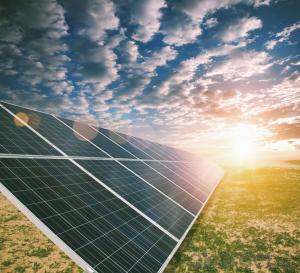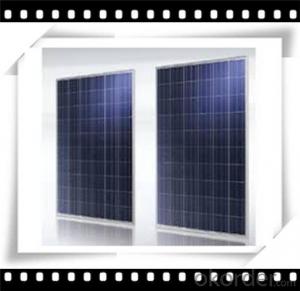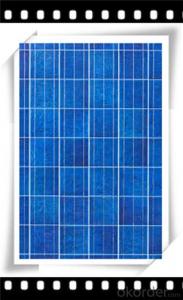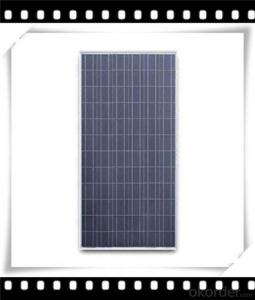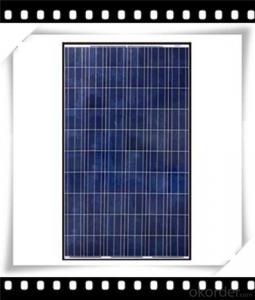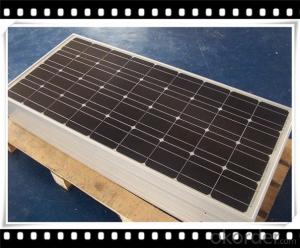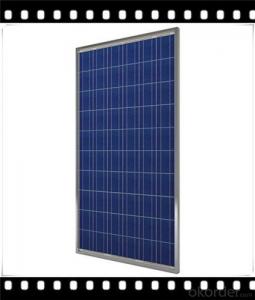240w Poly Solar Panel Medium Solar Panel Newest Solar Panel CNBM for Camping Trailer
- Loading Port:
- Qingdao
- Payment Terms:
- TT OR LC
- Min Order Qty:
- 10 set
- Supply Capability:
- 300000 set/month
OKorder Service Pledge
OKorder Financial Service
You Might Also Like
Polycrystalline Solar Modules
CNBM offers a range of small, medium and large polycrystalline solar modules, designed for a range of requirements.
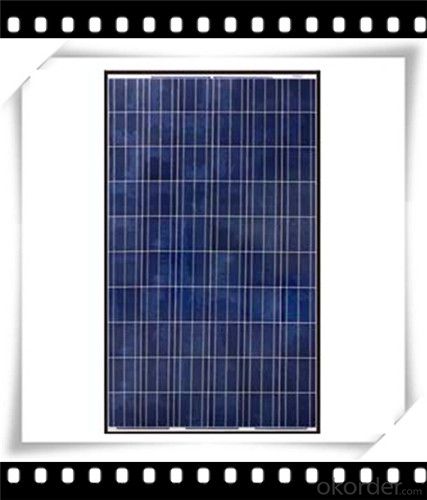
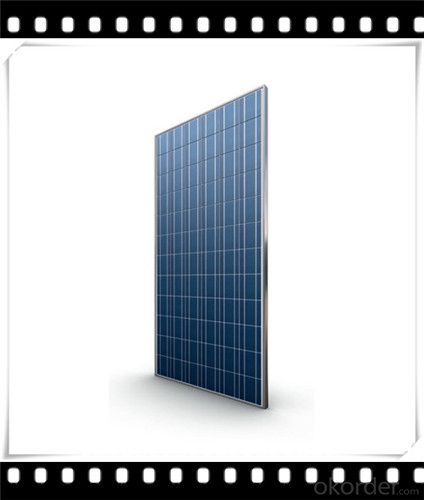
Specifications:
+/-3% |
Polycrystalline silicon solar cells (156 x 156mm) |
60 (10 x 6) |
1650 x 990 x 40 |
25.5 |
Limits:
Operating Temperature | -40~+85? |
Storage Temperature | -40~+85? |
Maximum System Voltage | 1000 VDC max. |
Hail Impact | Diameter of 28mm with impact speed |
Temperature and Coefficients:
NOCT | 48C+/-2? |
Voltage temperature coefficient (%/K) | -0.35 |
Current temperature coefficient (%/K) | 0.05 |
Power temperature coefficient (%/K) | -0.45 |
Characteristics:
Model: | SGM-200P | SGM-210P | SGM-220P |
Max-power voltage Vmp (V) | 29.2 | 29.4 | 29.41 |
Max-power current Imp (A) | 6.85 | 7.14 | 7.48 |
Open-circuit voltage Voc (V) | 36.5 | 36.69 | 36.9 |
Short-Circuit Current Isc (A) | 7.28 | 7.6 | 7.93 |
Max-power Pm(W) | 200 | 210 | 220 |
Model: | SGM-230P |
Max-power voltage Vmp (V) | 29.8 |
Max-power current Imp (A) | 7.72 |
Open-circuit voltage Voc (V) | 37.31 |
Short-Circuit Current Isc (A) | 8.19 |
Max-power Pm(W) | 230 |
STC: Irradiance 1000W/m2, module temperature 25?, AM-=1.5
Poly Crystalline Solar Panels Specifications Range
Maximum Power (Pm) | Dimension | Weight | Operating Voltage (Vmp) | Operating Current (Imp) | Open Circuit Voltage (Voc) | Short Circuit Current (Isc) |
0.45W | 140x80x10mm | 0.08kg | 3.3V | 150mA | 4.6V | 160mA |
1.0W | 162x140x10mm | 0.16kg | 7.5V | 150mA | 10.3V | 160mA |
4.5W | 269x251x23mm | 0.8kg | 16.5V | 0.27A | 20.5V | 0.3A |
10W | 420.1×268.9×22.6mm | 1.92kg | 17.5V | 0.58A | 20.5V | 0.6A |
20W | 425x502x50mm | 3.0kg | 16.8V | 1.19A | 21.0V | 1.29A |
30W | 593x502x22.6mm | 3.9kg | 16.8V | 1.78A | 21.0V | 1.94A |
40W | 655x537x50mm | 5.75kg | 17.3V | 2.31A | 22.1V | 2.54A |
50W | 839x537x50mm | 6.0kg | 17.5V | 2.9A | 21.8V | 3.17A |
65W | 1111x502x50mm | 7.2kg | 17.6V | 3.69A | 22.1V | 3.99A |
80W | 1204x537x50mm | 7.7kg | 17.6V | 4.55A | 22.1V | 4.8A |
- Q: I need to build a battery array to use with my solar panels I just bought. I want to be able to store enough energy to be draw from it at night, possibly around the clock. Is there a down side to using the deep cycle battery I bought from autozone and 6 or 7 more just like it, or do I need to get some other battery?
- There are batteries particularly made for solar, such as the Trojan T05-RE . I think the RE stands for renewable energy. A deep cycle battery should work all right, although not quite as well. What you want to do is try out your setup first, with just one battery, and the panels provided. If this is one of those 45 watt kits, you may be surprised at how little energy you actually get from the panels. Increasing the number of batteries won't help, either - that's like getting a larger water tank, when you only have a trickle to fill it. If your goal is really to save money, the most cost-effective solar is the grid-tied type, with no batteries at all. That's what we have, and I've never regretted it.
- Q: in the afternoon sun heat increases to high level due to which the panels heats up very high now my question is this heat will effect the panels life time and will damage the panels or not ??
- Most experts believe solar electric modules have a lifespan of at least 25 to 30 years and most manufacturers provide a warranty for this period. However, the truth is that we don't really know for sure since most modern solar panels have not been in existence that long. Many experts believe the actual number could be much higher, possibly as much as 50 years. What is very clear is that solar modules are extremely durable and lose very little of their energy generating capacity over time. From: bit.ly/tpTfK
- Q: I want to buy a solar panel from my house and I want to know how much it costs, what I have to buy and everything I need to know
- Have you looked at these other answers? Are they kidding? You can build a do it yourself solar panel for under 200 dollars and you can add another one each time you build another one. You can have 0 solar panels built for under $2000, under $2000 that right! Just go to this web site that will give you the details. Good Luck
- Q: Can solar panels be installed on a historic building?
- Yes, solar panels can be installed on a historic building. However, the installation process may require careful planning and consideration to ensure minimal visual impact and preservation of the building's historical integrity. Collaboration with preservation experts, architects, and local authorities is crucial to finding a suitable solution that balances renewable energy goals with the preservation of the building's historic value.
- Q: What, if any, improvement in efficiency per square foot or meter is realized by a solar panel in space vs. being mounted on the ground where the light is attenuated by the atmosphere?In passing, I found a site that gives an output of .89 watts / 4 in. sq for a particular home-mounted panel.
- Solar panels on spacecraft are a lot more efficient than ones made for home use. That doesn't include the effect of the atmosphere.
- Q: where can i get some solar panels for a camper trailer
- There are many suppliers for solar panels. Try camping shops, BQ or other leisure shops. Alternatively try one of the companies listed here:
- Q: My solar panel is 24long..It is set at 45deg..the arms are 8quot;long to achieve that angle for winter. I need to get to 7deg for summer..how long will the new arms need to be?..in layman's terms please...thx
- 2.20 approximatey (2 /4 -- ish) X = (tan7)(8/tan45)
- Q: Can solar panels be used in areas with high levels of heatwaves?
- Yes, solar panels can be used in areas with high levels of heatwaves. In fact, solar panels are designed to convert sunlight into electricity, and they perform better in areas with higher levels of sunlight and heat. However, it is important to consider the impact of excessive heat on the efficiency and lifespan of solar panels. Proper installation, maintenance, and cooling measures may be required to ensure optimal performance in areas with extreme heat conditions.
- Q: i trying to make a solar panel. right now i dont have money to go and buy a copper sheet. so can i make it out of aluminum foil. if there is a way please tell me how. and what do i use for wires. i making this to charge batteries.
- No but look in youtube for other ways of charging batteries . There is allot of neat ideas like building a small wind generator from scrap parts such as old speaker magnets copper wire out of transformers things that most people toss in the junk .
- Q: i need to know wat the parts of a solar panel are.
- Great answer Bill, I am just going to add aluminum frame and plastic clear cover on top of cells. The reason I am adding this is because after all this is installed then we have solar panel. Which as new looks and performs great but after a little while needs to be maintained. All factory warranties require solar panels maintenance to keep the warranty and optimum performance.
Send your message to us
240w Poly Solar Panel Medium Solar Panel Newest Solar Panel CNBM for Camping Trailer
- Loading Port:
- Qingdao
- Payment Terms:
- TT OR LC
- Min Order Qty:
- 10 set
- Supply Capability:
- 300000 set/month
OKorder Service Pledge
OKorder Financial Service
Similar products
Hot products
Hot Searches
